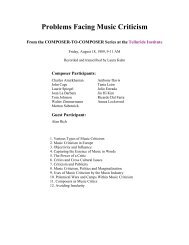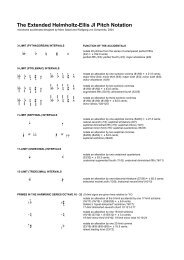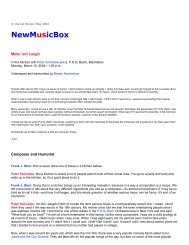Sixth World Symposium on Choral Music ... - NewMusicBox
Sixth World Symposium on Choral Music ... - NewMusicBox
Sixth World Symposium on Choral Music ... - NewMusicBox
Create successful ePaper yourself
Turn your PDF publications into a flip-book with our unique Google optimized e-Paper software.
New<strong>Music</strong>Box May 2003<br />
texts. And I came across an extraordinary volume of texts (I have to put <strong>on</strong> my glasses to read<br />
this—I'm getting old), which I found in a book entitled, May Sky: There is Always Tomorrow --<br />
An Anthology of Japanese-American C<strong>on</strong>centrati<strong>on</strong> Camp Haiku. I love it; I am humbled by it. I<br />
try to write it and have no success. Mine are all very surface, and when I read haiku I didn't know<br />
that there was poetic movement in the <str<strong>on</strong>g>World</str<strong>on</strong>g> War II internment camps. And so, I settled into<br />
reading the whole volume, and by the end of the reading I was a changed pers<strong>on</strong> for having<br />
understood how poetry sustains us, as music sustains us—through times in which our regular<br />
street vernacular, our choice of words just to express to each other <strong>on</strong> a daily basis really cannot<br />
carry the spirit of the day or the depth of the emoti<strong>on</strong> of the experience. And so, I set myself the<br />
task of making a selecti<strong>on</strong> of haiku from this volume and I selected a number of the haiku,<br />
thinking to make a compilati<strong>on</strong> under the title, May Sky, which is the title of my piece. But then,<br />
I began to think about the fact that these haiku had been translated into English—very beautiful<br />
translati<strong>on</strong>s—and it struck me that I ought to also set them in Japanese at the same time and<br />
create a motet of the English translati<strong>on</strong>s and the Japanese, and that stopped me dead in my<br />
tracks immediately because I do not speak Japanese and I needed to begin to understand how the<br />
language works and also the musicality that can be found within the language. I stalled out for a<br />
while, and had several c<strong>on</strong>ferences with Kathy Romey about my stalling out. Many times a<br />
commissi<strong>on</strong>er will ask a composer how things are coming, and we will answer, "Fine." You know<br />
the feeling? And often that means, I haven't got a note <strong>on</strong> the page, but d<strong>on</strong>'t worry. But if you<br />
answer "fine" three times in a row, then the commissi<strong>on</strong>ing pers<strong>on</strong> often knows that "fine"<br />
means, I'm stuck and a delicate c<strong>on</strong>versati<strong>on</strong> is being placed at that moment in time. And they are<br />
always the most fruitful c<strong>on</strong>versati<strong>on</strong>s, if every<strong>on</strong>e remains open. For me, it was that I just<br />
couldn't rec<strong>on</strong>cile the rhythm of Japanese with the rhythm of American English. American<br />
English is a very percussive and rhythmic language. Our lyricism really is not in our pitch, it is in<br />
how we c<strong>on</strong>struct our sentences rhythmically; we are a very lyrically rhythmic speaking people.<br />
And so, I struggled with it, and I finally found a soluti<strong>on</strong> for the piece so that it is set in both<br />
English and Japanese. The process of working with the choir is a w<strong>on</strong>derful process. I had asked<br />
for CDs because I too d<strong>on</strong>'t write for imaginary choirs. I can't imagine an imaginary choir,<br />
actually. And so I got CDs and found this extraordinarily rich sound, very unlike the American<br />
choral sound, and a kind of elegance that I haven't heard in Western-based choirs. And I used the<br />
CDs mostly as inspirati<strong>on</strong> for working with the choir, until yesterday, when we began to work in<br />
pers<strong>on</strong>. It was an extraordinary, delicate blossoming of the piece. I cannot think of a better way<br />
to describe the process that we went through yesterday. The piece is absolutely perfect,<br />
perfectly prepared and the tempo was lovely. I, like so many composers, listen and say, "Could<br />
we take it just a little faster?" And so we took it a bit faster. But what was a humbling and<br />
ecstatic experience for me was listening to the English in the setting. The English was there,<br />
beautifully spoken; yet it wasn't yet being sung. We worked very carefully. I asked a friend of<br />
mine, Charles Buckley of the Kansas City <strong>Choral</strong>e for help. Because we had about 15 minutes in<br />
order to teach shadow vowels and shadow c<strong>on</strong>s<strong>on</strong>ants c<strong>on</strong>necting a D to a T, "sound of," and we<br />
found the lyricism in singing in English, which really is hard in English. And the piece began to<br />
flow in a way that haiku flows. The image of the haiku—I didn't really talk about what I found in<br />
the words, so I will just be very brief about it—but I expected to find a heaviness in the subject<br />
matter when I started reading the book, just because of the situati<strong>on</strong>, which is an extraordinarily<br />
Composers’ Dialogue #1, 08/06/2002





